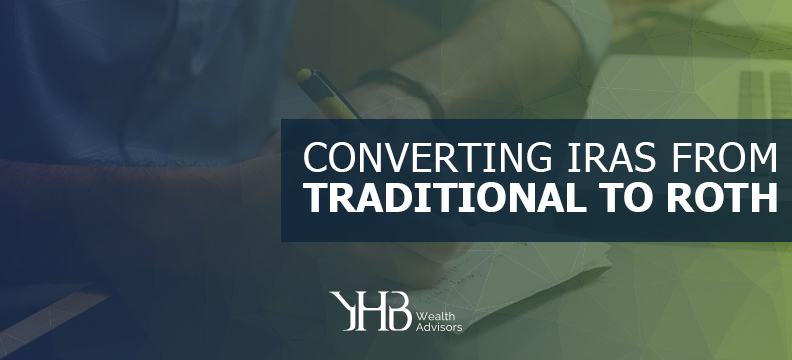

Converting your traditional IRA funds into a Roth IRA could have significant tax benefits to yourself and your family members, if planned correctly. Thanks to the Tax Cuts and Jobs Act (TCJA), there is an opportunity to take advantage of historically low tax rates before the rates are scheduled to reset to the previous levels by the end of 2025.
The basic concept behind Roth IRAs is that, generally, the income and gains generated in the Roth account, as well as distributions to the owner, are tax-exempt. In addition, the account owners are not subject to required minimum distributions (RMDs) during their lifetime. There are RMDs for non-spouse beneficiaries of the Roth IRA once the original account owner passes away, but those RMDs are still tax-exempt to the beneficiary.
The primary benefit of a Roth conversion is the ability to manage your taxable income and keep as much of the converted funds in the lowest possible tax bracket at the time of the conversion. The TCJA revised the tax brackets to be much more taxpayer friendly compared to the old law, resulting in taxpayers generally having more income taxed in lower brackets.
For example, under the current law, a married couple filing jointly can have taxable income up to $315,000 and be subject to an upper tax bracket of 24%. Whereas under the prior law, if the married couple had taxable income of $315,000, they would have been subject to an upper tax bracket of 33%. As noted before, these tax brackets are scheduled to sunset after tax year 2025, so it is important to keep that in mind when reviewing your current tax rates versus your expected future tax rates.
Managing taxable income can be a difficult task if your income is inconsistent from year-to-year and is dependent on factors outside of your control. One way to make the task easier is to review your charitable giving goals in conjunction with the Roth conversion planning.
Assuming you take itemized deductions, pairing income from the Roth conversion with a larger charitable deduction in the same tax year might be a good strategy to consider. Depending on your charitable goals and the nature of your investments, utilizing a donor-advised fund could be another possible strategy to review.
Beyond the tax bracket discussion, there are some other considerations to take into account in order to maximize the benefits of Roth conversion, including:
1) Your current tax rates vs. your expected future rates
2) The ability to pay the additional tax liability generated by the Roth conversion with non-IRA funds
3) Understanding your current and future living expenses, so that the converted funds can remain untouched as much as possible
4) Your time horizon for retirement and remaining life expectancy
Remember, the overarching goal of a Roth conversion is to get as much money into the Roth account at the lowest possible tax bracket. This allows the converted funds to grow tax-free for as long as possible. Therefore, it is important to consider if your overall financial situation will allow you to set aside funds in a Roth and leave them enough time to realize a worthwhile return on the investment.
Roth conversions can potentially be a very powerful tool to shift income from taxable to tax-exempt. There are many different factors to review when considering this strategy, however, and it may not make sense in all situations. It is important to plan carefully and have a discussion with your tax advisor before executing this strategy so that you can maximize the benefits for yourself, your spouse, and your future beneficiaries.


Alex Fleming graduated from Lynchburg College with a Bachelor’s degree in Accounting in May 2008. He interned with YHB right after graduation and then joined the firm as a full-time professional the following year in August 2009. During that interim year, he studied for and passed all four parts of the CPA exam and joined the AICPA and VSCPA. Alex began his YHB career with the bank audit team but has transitioned to the tax department out of the Middleburg office. He now specializes in complex tax planning and compliance for individuals, estate, trusts, private foundations, and privately-held companies. Alex has also obtained the Personal Financial Specialist (PFS) certification from the AICPA in September 2017.
